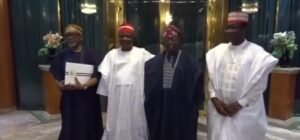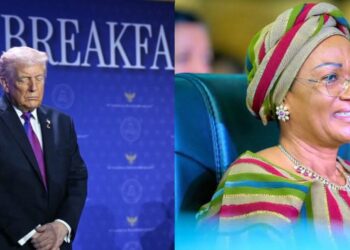.....NEC meeting may reshape APC leadership and trigger major defections

By Ibrahim Kegbegbe
As the All Progressives Congress (APC) gears up for its crucial National Executive Committee (NEC) meeting scheduled for Thursday, July 24, 2025, the Nigerian political landscape is buzzing with speculations about who will emerge as the new National Chairman of the ruling party. However, what has added fuel to this political anticipation is the surprise meeting between President Bola Ahmed Tinubu and Senator Rabiu Musa Kwankwaso on Monday, July 21.
This closed-door meeting, held at the Presidential Villa in Abuja, has sent a strong signal to political observers: the battle for the soul of the APC is not just about filling a vacant chairmanship position—it is about political strategy, realignment, and consolidation ahead of future electoral cycles.
READ ALSO:Kwankwaso Storms Aso Rock, Sparks Political Realignment Rumours
While the NEC will meet on Thursday to officially determine who takes over from the acting National Chairman, Ali Bukar Dalori or any other APC partisan, following Abdullahi Ganduje’s resignation, many believe that the eventual choice will not be made in isolation from larger political calculations currently unfolding in the country. The Tinubu-Kwankwaso dialogue, though shrouded in secrecy, appears too strategically timed to be dismissed as a mere coincidence.
It is no longer news that Senator Kwankwaso, leader of the New Nigeria Peoples Party (NNPP), has been quietly negotiating his way into the national power equation. What is surprising, however, is the pace at which he appears to be moving toward a potential alignment with the APC—a party he once left with fierce criticism. His presence at the Villa and engagement with President Tinubu strongly suggest that his political journey may be coming full circle.
If the APC leadership, as expected, takes into account the larger picture of national political stability and electoral strength, then the choice of the next National Chairman will be influenced not only by regional balancing and loyalty but also by the capacity to draw political bigwigs like Kwankwaso into the party’s fold.
This unfolding political chess game could result in a flood of defections in the coming weeks. Already, whispers are growing louder in Abuja that several high-ranking politicians from the PDP and NNPP are preparing to jump ship and align with the APC—a party that, under Tinubu’s leadership, is redefining its political strategy.
In this context, Thursday’s NEC meeting could serve as both a platform for internal restructuring and an opening for broader political reconciliation. Should the APC leadership announce a chairman with strong bridge-building capacity, it will be a clear message that the party is preparing not just for 2027, but for a larger, more inclusive political future.
Yet, this must be done with caution. Nigerians are watching, and the APC cannot afford to offer symbolism without substance. The incoming chairman must possess integrity, political maturity, and the foresight to manage the growing complexities of Nigeria’s diverse political culture.
What may appear as an ordinary leadership transition within the APC could, in fact, be the beginning of a major political realignment. The Tinubu-Kwankwaso meeting should not be seen in isolation. It is a harbinger of a deeper strategic move that may culminate in the redefinition of party politics in Nigeria—and perhaps, an expanded APC.

















